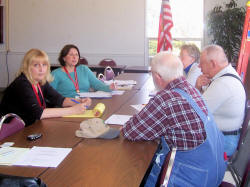|
 Community Action, Habitat explain plan
to work together Community Action, Habitat explain plan
to work together
Partnership plans to seek
grant to buy and restore foreclosed homes
 Send a link to a friend
Send a link to a friend
[April 18, 2009]
Leaders from Community Action
and Habitat met Wednesday afternoon to discuss collaboration between
the two organizations in order to apply for grant funding for a
housing rehabilitation program for Logan County. Angela Stoltzenburg,
executive director of the Community Action Partnership of Central
Illinois, along with the agency's community services program
director, Kathy Shepherd, met with Toni Reifsteck, Joe Runyon and
George Dahmm, representing Habitat for Humanity. Also attending was
Mayor-elect Keith Snyder.
|
 The Illinois Housing Development Authority has identified that there are 41 counties
in Illinois with excessively high
foreclosure rates and Logan County is among the 41. The Illinois Housing Development Authority has identified that there are 41 counties
in Illinois with excessively high
foreclosure rates and Logan County is among the 41.The funding
that the partnership of Community Action and Habitat is seeking will
ultimately come from the U.S. Department of Housing and Urban
Development.
The purpose of the funding is to allow the partnership to
purchase foreclosed and abandoned homes in Logan County, refurbish
those homes or demolish and rebuild them, and then sell them to
income-eligible families at a significant savings with zero-interest
mortgages.

The grant would come to the partnership as a sub-grantee through
the Illinois Community Action Association. The association is
putting together groups of four or five troubled counties that could
benefit from the funding. Each county will submit its own grant
application, which will be combined by the ICAA.
Stoltzenburg explained that when the grant is finally awarded,
some counties could be left out, as it is with most state and
federal grants. There are no guarantees that Logan County will
receive any of the funding.
If the grant is awarded, the partnership will receive
approximately $600,000. With those funds they will be expected to
purchase the homes, insure them and do all the rehabilitation work
to make the homes livable.
The grant specifies that the homes must be purchased by Community
Action for no more than 75 percent of their appraised value at the
time of purchase. Stoltzenburg and Reifsteck agreed that they could
purchase a total of seven homes. Because Habitat work is done by
volunteers, expense for the rehab will be limited to the cost of
building materials.
Reifsteck said that by the time the grant is awarded in June,
there should be a total of 15 homes available in the city of Lincoln
alone. While the grant is for the entire county, she added that they
would probably have to work within the parameters of Lincoln because
that is where the majority of their volunteer base is.

Stoltzenburg said that the grantor is recommending that the rehab
homes be located in the same neighborhood so that there can be some
stabilization of that entire area.
Reifsteck noted that of the list she has right now of foreclosed
and abandoned homes, she is showing that there are three grouped
together and two more within just a few blocks.
In the partnership, Community Action and Habitat will each have
their own roles to play. Community Action will be the administering
agency, responsible for all the reporting to funding sources. The
agency will also purchase and hold ownership of the homes during the
rehabilitation process, pay for all building materials and provide
insurance coverage on the buildings until they are turned over to
Habitat.
[to top of second column] |

Habitat will select the families who will purchase the finished
homes, take those families through the Habitat homeownership
counseling services, be responsible for acquiring building materials
and provide the labor for the rehab.
Once the homes are purchased, families will be chosen before
rehab begins. Each family will be required to meet Habitat income
guidelines and volunteer a total of 250 hours per family to Habitat,
with 100 of those hours being working on their own home.
When the homes are finished, they will be reappraised and a new
market value set for their improved condition. Each home will be
sold at 70 percent of the finished appraised value and will be
matched to the family according to size. Rehab will be done so as to
accommodate any special needs of the family, such as handicap
accessibility or hearing assistance.
When a home is completed, Habitat will have the customary home
blessing and turn the keys over to the recipient family. At that
point the ownership of the home will transfer from Community Action
to Habitat, and Habitat will own the mortgage on the home until it
is paid off.

Stoltzenburg pointed out that this program would be a terrific
resource for Habitat because the grant is going to pay for everything, but
the mortgage payments will go directly to Habitat, which will
increase their cash pool, allowing them to go forward with other
projects.
Stoltzenburg will be responsible for filing the grant application
and has a series of deadlines she must meet between now and the end
of April.
The grant is scheduled to be awarded in June. Once awarded, the
partnership would have 18 months to obligate all the funds to
projects and a total of four years to complete the projects.
Habitat will be looking for volunteers to help with these
projects as well as others they are working on. Anyone who is
interested in volunteering should call the Habitat office at
732-6412.
Anyone who would like to learn more about this home
rehabilitation program can contact Community Action at 732-2159 or
Habitat for Humanity for more information.
[By NILA SMITH]

 |